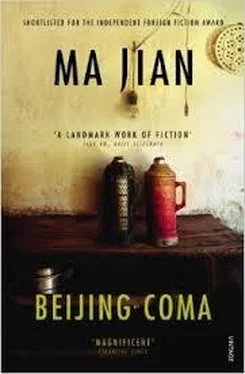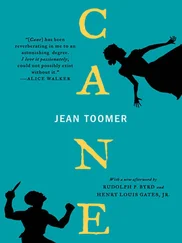In his gravelly voice, Shu Tong told the crowd that thousands of students were staging a peaceful sit-in outside Xinhua Gate, the southern entrance to the Zhongnanhai compound in which the government leaders live and work. He said that the student movement had kicked off and would soon spread to the rest of the country, and he urged Beijing University to join it at once.
His description of the sit-in surprised the crowd, because a few hours before, the state television had reported that the students at Xinhua Gate had demanded to speak to the government leaders and that, when their request was refused, had attempted to storm the gate. The report showed shots of armed officers with blood pouring down their faces, and claimed that the students had hurled empty bottles at them. But Shu Tong insisted that the mood was peaceful, and accused the government of fabricating lies. He admitted that there had been some pushing and shoving and that a few students and officers had got hurt, but denied that the students attempted to storm the gate. He said all they wanted was to submit their petition.
When the meeting came to an end, Ke Xi asked Shu Tong to join our committee too. He agreed, but suggested that we change the name to the Beijing University Solidarity Student Union Preparatory Committee, to make clear our spiritual links with the Polish democracy movement.
But we stuck to the name ‘Organising Committee of Beijing University Independent Student Union’ and drew up a list of founding members: Old Fu, Ke Xi, Liu Gang, Wang Fei, Zhuzi, Yang Tao, Shu Tong, Shao Jian and myself. We appointed Old Fu convenor, made up a batch of armbands and began printing off flyers and leaflets. Yang Tao was sent to Qinghua University to help them set up a committee of their own. At ten o’clock we convened a meeting to formulate an action plan. Then most of the guys set off for Xinhua Gate to join the sit-in. I hadn’t slept properly for two days, so I staggered back to my dorm and went to bed.
Perhaps the rain has stopped. Everything sounds calm outside. All you can hear is the swish of bicycle wheels that grows louder and then fades away again.
At five in the morning, I was woken by a loud commotion. I rushed out into the corridor and heard students climbing up the stairs shouting, ‘We were at the sit-in at Xinhua Gate. The police beat us up. They attacked us with electric batons. Lots of students have been rushed to hospital!’
I flung on some clothes and followed everyone else out to the Triangle. Wang Fei was there. ‘Hundreds of policemen charged at us,’ he yelled, his voice as hoarse as a cockerel’s. ‘They pushed students into their vans, beating anyone who resisted. Girls who didn’t manage to run away fast enough were kicked and beaten too!’
‘At three o’clock, ten police officers rammed a student from Wuhan against the wall,’ Shao Jian continued. ‘They whipped him about the face with leather belts. There was blood everywhere. One of his eyes was beaten out. It was horrible.’ His usually calm voice was shaking. He told everyone to shout with him as he cried: ‘Boycott classes! Save our nation! Punish the violent assailants!’
‘The students are innocent! Patriotism isn’t a crime!’ the crowd yelled. Students were waking up and joining us in the Triangle. There were hundreds of us gathered there now.
‘We must stage a mass march to tell the public what happened,’ I said angrily.
Although not all the members of Organising Committee were present, Old Fu gave the go-ahead for the march and Shu Tong agreed. I dashed off ten posters attacking the police violence and calling for a class boycott. Chen Di and I then stuck them onto the bulletin boards, the campus gates and even the sides of public buses.
Han Dan hobbled back, weak and panting for breath. He told us that undercover agents had infiltrated the sit-in. They had walkie-talkies. They stole some of the students’ shoes and flung them at Xinhua Gate to give the police a pretext to attack the crowd. ‘Punish the perpetrators of violence! Boycott classes!’ he shouted indignantly. None of us could go back to sleep after we heard this news, so we set to work on organising the march.
Now that the student movement had taken off, we felt a weight of responsibility fall heavily on our shoulders.
At dawn we went to the corner shop and bought paper, black ink and a large roll of red cloth — long enough to make five ten-metre-long banners. Chen Di’s girlfriend had collected two thousand yuan in donations, which was much more than Tian Yi had managed. Although the girl spoke with an annoying nasal twang, she had a persuasive manner.
I carried the roll of cloth to Sister Gao’s dorm. Tian Yi and Bai Ling helped cut it into banners and armbands. I wrote PUNISH THE POLICE! and LET THE TRUTH BE KNOWN! onto the banners while the girls wrote slogans on the paper pennants I’d prepared.
Thousands of students gathered in the Triangle, ready to set off on our march. I rushed to the canteen with Tian Yi and wolfed down a plate of steamed dumplings, then raced back to Wang Fei and Shu Tong’s dorm, which had now become the Organising Committee’s stronghold. When I arrived, Wang Fei was arguing with Old Fu, who’d changed his mind and now thought that we should cancel the march and focus on building up democracy within the campus.
Only seven of the nine members of the Organising Committee were present. We took a vote. Liu Gang sided with Old Fu, but Shu Tong, Han Dan, Wang Fei, Zhuzi and I voted to carry on with the march. Although I secretly agreed with Old Fu and Liu Gang, I didn’t want the banners and pennants we’d made to go to waste.
‘All we want is a bit of democracy,’ Old Fu said. ‘There’s no need to stir up a popular movement.’
‘If you want democracy, you must fight for it, not waste time spewing empty rhetoric!’ Wang Fei tossed his cigarette stub onto the cement floor and stamped it out, then picked up the banner he’d made from a torn bed sheet.
‘The Chinese people have been on their knees since 1949,’ Han Dan said. ‘It’s time they stood up and stretched their legs.’
‘You shouldn’t dismiss my views,’ Old Fu countered. ‘Lenin said that truth often lies in the hands of the minority.’
‘We’ve put up hundreds of notices about the march,’ Zhuzi said disgruntledly. ‘The students are waiting to set off. We can’t back out now. You don’t have to join us if you don’t want to, Old Fu.’
‘All right, then, I hereby resign from the Organising Committee,’ Old Fu said, removing his glasses as sweat trickled down his forehead.
‘You haven’t slept much these last few days, Old Fu,’ I said, pulling him out into the corridor. ‘Your eyes are swollen. You should get some rest, give your liver time to recover, then reconsider all this when your mind’s a little clearer.’
He moved closer to me and said quietly, ‘I’ve written my suggestions on this piece of paper. Here, put it in your pocket. If you get a big enough crowd, go ahead with your march. But if the numbers dwindle, cancel it. As head of security, that’s your prerogative.’
I told him to go and have a nap on my bed, and said we could talk about this later.
Wang Fei had returned from Xinhua Gate unharmed, so I suspected he’d sneaked away from the sit-in to avoid getting caught up in any violence. ‘Hey, Wang Fei, I bet you fled as soon as the armed police turned up!’ I smiled.
He wiped the thick lenses of his glasses and said, ‘As I was leaving, a policeman stopped me. I told him I was a magazine editor and just passing by. But the bastard searched my pockets and found a bread roll, so he knew I’d been there all night. Before I had a chance to come up with an excuse, he kicked me in the bum and told me to get lost.’
Читать дальше












